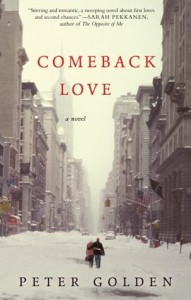 Synopsis:
Synopsis:
Gordon Meyers has neither seen nor spoken with Glenna Rising for thirty years. They met in 1968 and lived together for the better part of two years before breaking up. Gordon served in Vietnam and returned home to launch a successful consulting firm. In the ensuing years he has traveled the world, been married and divorced once, and raised a son, Alex, now twenty-five, that he adores.
Glenna was a medical student when Gordon interviewed her for a newspaper article he was writing about the raging battle for abortion reform in New York. The daughter of a physician, Glenna shared a house with fellow future doctors Biff and Robin. It was a crazy, turbulent time and Glenna was smart, beautiful, and sexually free. Gordon was instantly mesmerized by her.
Countless nights alone in nondescript hotel rooms around the globe have left Gordon wondering what became of his dreams, ambitions, and most of all, the future he once believed he shared with Glenna. He has never stopped thinking about her and has learned that she is a practicing pediatrician in Manhattan. When snow grounds the flight Gordon was supposed to take to spend the holidays with his sister, he opts to drive instead . . . and take the opportunity to pay a surprise visit to his old flame. Gordon has a very specific reason for reconnecting with Glenna on this particular day.
After Glenna gets over the shock of Gordon’s presence in her office waiting room, the two of them go out to have a drink and catch up. Is it possible to go back and pick up the pieces of a lost love so many years later, overcoming the hurt and anger that destroyed the relationship? Can the passion that drew them together when they were so young be rekindled at this stage of their lives? Is that what Gordon really wants? Or is he looking for something else?
Review:

Gordon Meyers is floundering when he meets Glenna Rising, a medical student who not only skipped a year of high school, but graduated from college in three years and is ranked number seven in her medical school class at a time when women were still far-outnumbered by men. Gordon is in his fifth year of study at Brooklyn College — it’s a wonder he hasn’t been academically disqualified due to his poor grades — and is really only hanging in there to avoid the draft. His father was a decorated World War II veteran and his mother cannot bear the thought of waiting for her only son to come home from Vietnam the way she anxiously awaited his father’s return. Gordon wants to write fiction, but when his uncle makes a connection for him with a local newspaper he accepts the chance to author an article on the fight to legalize abortion — he will earn twenty dollars and see it published if it is any good.
Gordon ends up interviewing Glenna for the article and he is immediately taken in by her beauty, brains, and flirtatiousness. Glenna is interested, but whether Gordon will be anything more than a conquest is not clear at the outset. As the story proceeds, Glenna’s troubled family history is revealed, giving readers a context for her complex emotions — not that being a woman coming of age in the late 1960’s and entering a male-dominated, highly stressful profession wasn’t, in and of itself, sufficient. From the outset, Glenna is a more difficult character to love than Gordon and readers who do not remember the 60’s — particularly women’s struggles for equality, recognition, and justice — may have a harder time relating to and empathizing with her than those of us who vividly recall those days.
First love rarely comes along with the knowledge that you can lose that love. So when people meet and fall in love, and they’re so deeply connected, it doesn’t seem to cross their minds that this is going to end. And I think when it ends, people are never the same again. They’ll have other people that they will love — probably in a much more adult way — but they’ll always know that this is fragile. You can’t tell a young person, “You know this isn’t going to be forever.” It doesn’t even register. That’s because they have no experience of that profound loss.~ Author Peter Gordon
The story is conveyed via Gordon’s first-person narrative and entirely from his perspective, with the action shifting between the present and his recitation of past events. He frankly describes the passionate, uninhibited life he shared with Glenna and, most importantly, the strong connection he felt to her from the moment he met her. Although Gordon instantly felt as though he had known Glenna his entire life, she repeatedly tells him that he doesn’t really see her, which perplexes and frustrates Gordon. That notion is reinforced by her less attractive, ice cream-eating, overall-wearing roommate, Robin, an active member of Students for a Democratic Society (SDS) with whom Gordon ends up trekking to Woodstock in 1969. Tension in the house is also created by Biff, the Brooks Brothers-wearing, trust fund baby who also shares the residence with them. Biff has long desired Glenna himself and offers his own snarky commentary at every opportunity.
Gordon and Glenna’s breakup is sufficiently dramatic to keep them apart for decades, during which each of them becomes successful, financially comfortable, and loves again. But no other love measures up or fulfills in the same way and, as the story opens, Gordon is driven to at last find answers to the questions that have haunted him through the years. Golden skillfully guides his characters through their first meeting in thirty years with a tone and tenor that is tentative and believable. Can they work through their lingering hurt and move past long-held resentments to resume their relationship? Do either of them truly want to try starting over now that they have been reunited and are getting to know who each has become in the ensuing years? In Golden’s skilled hands, the characters’ journeys feel authentic and readers, who have been endeared to them by that point through the book’s earlier revelations of their history, will want only the best for both of them.
Critics are drawing the inevitable comparisons of Comeback Love to the work of Nicholas Sparks, perhaps the best-known male writer of romantic fiction. But that comparison is not only inaccurate, in my opinion, but also does a disservice to Golden. Comeback Love contains a depth of emotion and understanding of the complexities of human motivations that propels it beyond Sparks’ achievements, making comparisons to works like Jean Davies Okimoto’s Walter’s Muse more apt. I highly recommend Comeback Love to readers who crave romantic fiction about and for mature adults, and look forward to reading more from Golden.



9 Comments
I love stories that aren’t run of the mill young couples falling in love. Thank you for the review! Comeback Love sounds great–and I love the interesting cover!
A wonderful story which is memorable. thanks.
This book sounds wonderful.
A book that is special and lovely.
Now this looks like a book for me! The cover got my attention right away and I’m curious to see what Gordon’s true motives are for finding her again. Thank you for the opportunity to read it!
I would love to read this. This sounds great!
Nice review. The book sounds very interesting.
Can’t wait to read this.
pjames330 at aol dot com
This book looks intriguing, thanks for a chance to win it! 🙂